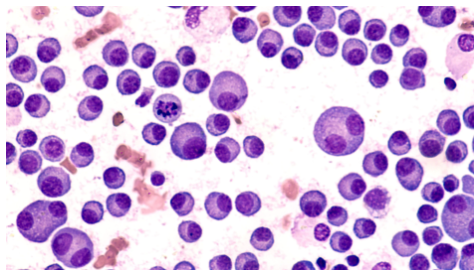News
Article
New Vaccine Significantly Improved Lifespan of Patients With Multiple Myeloma in Phase 1 Trial
Author(s):
Most patients had improved clinical response within 90 days of receiving the dendritic cell vaccine and ASCT.
Patients with multiple myeloma (MM) who received a dendritic cell vaccine before autologous stem cell transplant (ASCT) had a significantly improved immune response, according to study authors who published their findings in the journal Clinical Cancer Research. The goal of the vaccine established during the trial was to trigger an immune system response against the protein survivin.
Image credit: David A Litman - stock.adobe.com

“High expression of survivin at diagnosis is associated with poor outcomes,” said senior study author Frederick L. Locke, MD, chair of the Blood and Marrow Transplant and Cellular Immunotherapy Department at Moffitt Cancer Center, in a press release.
The vaccine increased patient survivin-specific CD4 T cells by 35%, but 85% of all patients had a T cell or antibody response against survivin, Locke said. Following vaccination and ASCT, approximately 30% of patients also exhibited a higher CD8 T cell count, and 9 of 13 patients were producing antibodies against survivin peptides.
MM is considered an incurable cancer, but the vaccine may be able to “get [patients] into remission and potentially keep the cancer from coming back,” Locke said in the press release. The vaccine uses dendritic cells in the immune system to break down foreign proteins into their peptides. These peptides are delivered to immune cells that, in turn, can produce an effective immune response, according to Locke.
Currently, patients with MM receive induction therapy and chemotherapy prior to ASCT. However, many patients show signs of cancer following induction therapy. Investigators conducted a phase 1 trial to evaluate the efficacy, safety, and immunogenicity of a dendritic cell vaccine prior to ASCT.
The team of investigators enrolled 13 patients with high-risk MM who received induction therapy (not ASCT) but continued to have active disease. Patients received 1 dose of the vaccine within 30 days of ASCT and a second dose at day 21 post-ASCT.
At median follow-up (4.2 years), 6 of 7 patients who had an improved clinical response at 90 days post-ASCT were alive and disease-free. With this treatment, 4-year progression-free survival was boosted from 50% to 71%.
The dendritic cells only express one version of the survivin so that the vaccine can maintain safety, alongside efficacy. Patients only exhibited minor adverse events, showing the vaccine to be well-tolerated as well as effective.
The study contains some limitations. Locke noted that comparing the efficacy of new innovations in MM treatment, such as next-generation chimeric antigen receptor (CAR) T-cell therapy and bispecific antibodies, to older treatments can be limiting. Further, patients with MM are not commonly evaluated in prospective clinical trials.
“Our study showed that we can target survivin with a vaccine-based approach and induce immune responses, and it suggested that this strategy could ultimately help improve patient outcomes,” Locke said in the press release. “Larger, randomized studies are needed to confirm our findings and to assess whether moving vaccination to earlier in the disease course would be beneficial in preventing patients from developing aggressive forms of myeloma.”
Reference
A Dendritic Cell Vaccine Was Safe and Induced Immune Responses in Patients With Multiple Myeloma. American Association of Cancer Research. September 22, 2023. Accessed on September 22, 2023.
Newsletter
Stay informed on drug updates, treatment guidelines, and pharmacy practice trends—subscribe to Pharmacy Times for weekly clinical insights.






